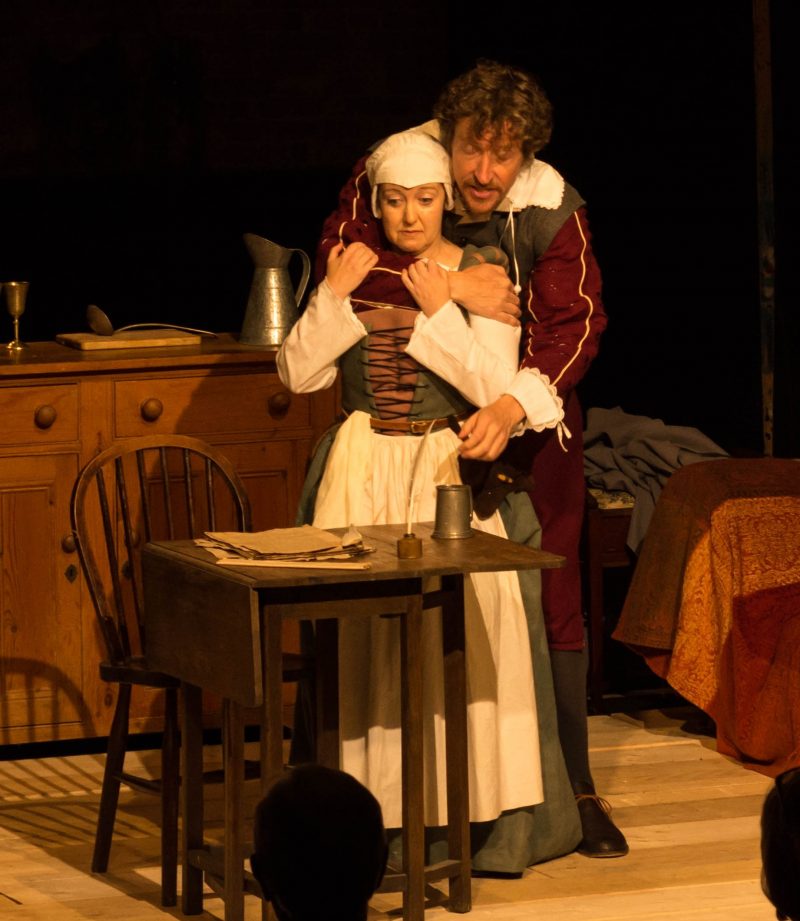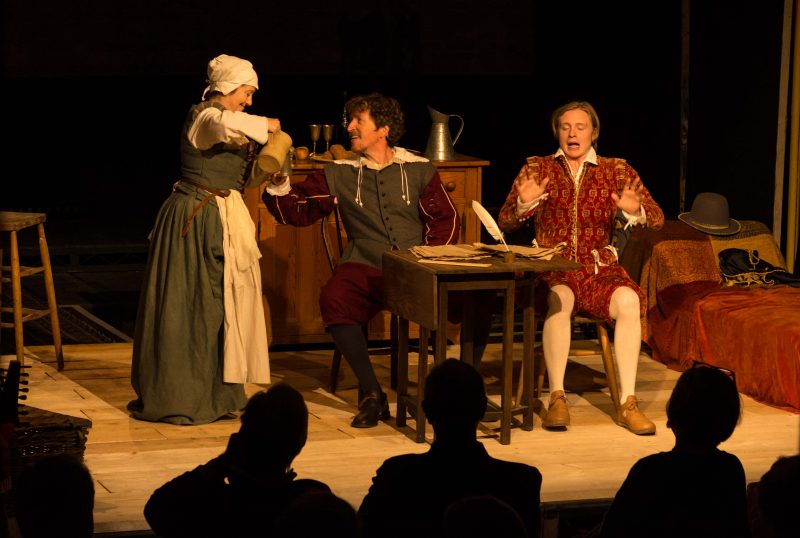It is 1613. William Shakespeare and John Fletcher meet in a room above a Southwark pub. They have until morning to complete The Two Noble Kinsmen, but tiredness, failing memories, lost loves and drink are all getting in the way.
After a successful London run, which commenced 400 years to the day after William Shakespeare died, Fletcher in Rye CIC (the Community Interest Company which helped bring the Kino cinema to Rye) and the Rye Arts Festival (RAF) brought For All Time to Fletcher’s birthplace, Rye. For All Time by Rick Thomas had its London premiere at the George in Borough High Street – London’s oldest pub (probably) and an inn Shakespeare and Fletcher would have both known well (which was rebuilt in 1677 after a disastrous fire).
The Rye Creative Centre is very different from the galleried loveliness of a Jacobean inn, but in many ways a more appropriate venue for this play about the theatre – and the Rye Arts Festival featured it on Monday September 19.
Between the London run in April and the RAF in September, there was a need to have a new cast and to re-rehearse the play for the one-off performance. In only eight days, Roger May (William), Jamie Finn (John) and Nia Davies (Margaret), directed by Dugald Bruce-Lockhart, constructed an epic drama of love, words and drinking.
The producer of the play, Hugh Kermode, said: “The theatre industry did not die with Shakespeare in 1616, it flourished with more popular and populist plays – many of the better ones written by Rye’s own John Fletcher who was Shakespeare’s successor as the chief writer of The King’s Men. For All Time takes the moment when the playwriting-baton is passed between these two men and, peppering it with anachronism and innuendo, leads us to draw our own conclusions about why Shakespeare stopped creating plays three years before he died.”
For All Time was written by Rick Thomas who, as a chorister, sung in St Mary’s Church, Rye. Now living in Cumbria, Rick wrote the play in 2009 and it was premiered at the Theatre by the Lake in Keswick. It was spotted by Hugh Kermode of the newly formed “Fletcher Group” and later that year a play-reading was performed at The Mermaid Inn.

The RAF, Fletcher in Rye and “angel” investors backed the project to run the play for 10 days in London with a performance in Rye in September – and it will tour other theatres in 2017.
So what happens when a famous author gets writer’s block? Several possible answers are supplied in this imagined meeting between collaborators William Shakespeare and John Fletcher.
The stage set was simple, the Elizabethan costumes rich, and the wit flowed in good Shakespearean tradition. Set in a room above an inn, various themes competed with each other, but predominantly the sense of loss – loss of a husband, a lover, a son. With this emotional charge went feelings ascribed to the playwright himself of loss of sight, loss of inspiration. Why did his plays always seem to include madmen, asked Margaret, the tavern keeper?
The speech of the melancholy Jacques in As You Like It on the seven ages of man: sans teeth sans everything, was hinted at. But all that was overlain with a veneer of wit and comedy, so much a trademark of the bard of Avon.
Director Dugald Bruce-Lockhart said: “ I rehearsed the cast for about seven days before we opened in Rye. Short and sharp but I felt we managed to get it right and I was also very pleased with the audience response – a fun night all round!”
Photos: Rye and District Camera Club




Even in Rye, the man in the street, if asked what RAF stood for, he would invariably answer – the Royal Air Force – NOT the Rye Arts Festival!
Please STOP referring to it in this way. It is confusing and inaccurate.